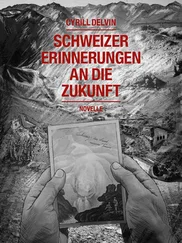Ted nodded reluctantly.
»For the general basic training we’ll work together with ›Teachers Without Borders‹.«
»›Teachers Without Borders‹,« Cheng mumbled, »it fits.«
»What do you mean?«
»I’ve always envisaged training camps, but the idea of flying tutors for the education of the broader population is more suitable in these parts.«
»And it is and will be a cross-generational project. Ismail will work out our plan of action with you over the next two weeks.« Françoise addressed Ted: »He’s a teacher of Arabic from Jordan and a designated project manager with ›Teachers Without Borders‹. The mission in Gaza is limited to five years.«
Ted’s anger had dissipated as quickly as it had erupted and the rest of the meeting passed without further incidents.
In the early afternoon, Francoise und Cheng took the helicopter to Cairo International Airport. Right after take-off, Françoise noticed that the dinghy was still moored to the Malta. She’d completely forgotten to ask Ted about the person on it. The higher up they got, the more distinctly the Gaza Strip contours became visible in the East. In the distance they could discern the wall winding like a snake around the non-annexed territory. Inside the wall the population was hopelessly dense; outside it was more thinly spread.
Meanwhile a strange spectacle took place on the ocean. The three IWAC freighters were anchored at regular intervals from the coast, mirroring the large checkpoints along the wall. Every afternoon the cargo fleet was surrounded by an unending stream of various sized-boats, from small to tiny. Like ant trails, they travelled in lines from the ships to the shore. But here, people didn’t have to queue up for inspection. More than half a million Palestinians inside the Gaza Strip had thus been supplied with the essentials for just under two years.
The IWAC had pledged their resources for a decade. By then, the coastal strip had to be economically self-sufficient. An ambitious goal and Françoise felt overwhelmed at the thought.
Every day after morning prayers, Haīkal walked to the city with his small band of orphans from the al-Qubāʾ refugee camp where the children lived without parents or relatives. Most of them, like the fugitive families housed here, came from even poorer regions to the south of the Gaza Strip or the surrounding areas of the Israeli cities Netivot or Sderot from where they had been evicted. The orphans among them now had to fend for themselves. Some were taken in by other families from the same or neighbouring villages. Others found nobody.
Up to a few years ago, the PLO, then the Fatḥ and finally Ḥamās had been the sole Palestinian organisations to care for these children. Not always on humanitarian grounds only, but frequently motivated by political calculations. It was a means to gain prestige and the support of the local population. The children were often placed in fundamentalist Islamic schools. It was soon a generally accepted side effect of the system that later on, as young adults, they could be easily talked into suicide missions.
The necessity to fight had slowly but firmly lodged itself in the Palestinians’ hearts over the long years of conflict with Israel. For the majority this was simply a matter of survival. But for a few of them, who had attained notoriety in a media world craving for news, it was a question of non-negotiable faith and rights issues. They became heroes in the holy war against the occupying forces and the infidels.
A couple of years ago, however, something had started to change in al-Qubā and the other refugee settlements. Alongside the local organisations and the few international aid agencies, a new provider slowly captured the refugees‘ souls. Suddenly Ḥamās was no longer the only organisation present with slogans and food. It still remained the only one to engage in inciting propaganda, though the new group’s influence increased steadily. Not through empty words, but concrete deeds. The organisation appeared to have unlimited access to food, medical supplies and clothing for the impoverished population.
Right from the start Haīkal ingratiated himself with the ›newcomers‹: »The new benefactors have arrived. They’re bringing rice and bread, Allah be praised. They’re helping us to get fat without lifting a finger.«
»Just have a look,« laughed a stocky man bowing with an expansive arm movement, »our fasting brother from al-Qubāʾ honours us with his presence. If he won’t take anything more off us, we have no choice but stuff ourselves.«
Haīkal wasn’t accustomed to someone standing up to him, but he quickly recomposed himself. The foreign aid workers were usually pompous and arrogant or quiet and uncommunicative; rarely funny and frequently American or European. But these ones here all seemed to be from the region.
»Indeed,« Haīkal countered, » you certainly don’t need any more food…«
»Unlike you,« the stout man interrupted the gangly youth. He rummaged through a bag and handed Haīkal a Farareer: »Take it and eat in peace.«
Haīkal looked at him in amazement, but accepted the sweet pastry without hesitating. He could hardly remember ever having been given something so delicious.
»Thank you,« he said, now in his normal tone of voice. »My name is Haīkal.«
»I am Ḥusām, Ḥusām Ḫalīl from Egypt.«
The two of them looked at each other and before Haīkal could turn to leave, Ḥusām added: »And we can do with people like you to give us a hand.«
It was the first time the fifteen year old boy had ever been asked for his help. Three years ago Haīkal had come to Gaza looking for work. The little village close to the Israeli border where he had grown up couldn’t provide for him anymore. And the wall relentlessly held the children and adolescents entrapped in its own world. But even the big city couldn’t offer enough work for everyone, and so he barely scraped a living. Like other boys of his age, he had ended up in the camp and was compelled to revert to begging, sometimes stealing.
So far he hadn’t succumbed to the Ḥamās; the tales of paradise and martyrs they dished out simply seemed too ridiculous and insipid. And Haīkal was well versed in the art of story-telling. Ever since he had been a child, he had regaled the people in his village with his stories. A gift which didn’t make life any easier, but frequently more tolerable.
»So?« Ḥusām probed.
Haīkal just stood there open mouthed. The question had actually left him speechless for once. He still hadn’t decided if he should be glad or annoyed about the offer. What was he supposed to do the whole day long if he’d already filled his belly in the morning? Besides, he had become his own master by now. On the other hand, it was tempting to help the feisty Egyptian. He might have some fun.
»What kind of help?« he wanted to know. »I don’t have time for pointless stooge work. I’m a skilled… a skilled… bricklayer. And I won’t blow myself up into paradise. Are you Ḥamās people?« Haīkal bit his lip. It had been a while since he had expressed himself that badly.
Ḥusām suppressed a giggle: »We are not, and we don’t sell tickets to paradise or to hell either for that matter. We just need people to help us transporting our supplies. It’s just an unpaid afternoon job. We feed everyone anyway, doesn’t matter if they help us or not.«
»In other words, the works not demanding, utterly boring, and doesn’t get me anywhere,« Haīkal rediscovered his voice. »It sure sounds like the ideal job for someone like me. And when I’m big and strong, I can still be a bricklayer or a bomber.«
This time the Egyptian couldn’t stifle his laugher. »In that case I can only hope you don’t grow up too fast. See you tomorrow after prayers.« A handshake settled the matter. Haīkal’s eyes beamed when he ran back to the camp and bit into his Farareer.
Читать дальше












